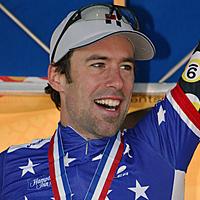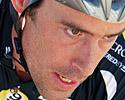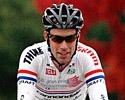
Recently on Cyclingnews.com |
An interview with Tim Johnson, January 4, 2008
Unfinished Business
In 1999, Tim Johnson was the first American rider to stand on the podium in a cyclo-cross World Championship back as the U23 bronze medallist, but he then embarked on a tumultuous road career, leaving the highest level of 'cross. Seven years after his first US title, Johnson is once more on top of the US 'cross scene and back in Europe to prepare for the World Championships in Treviso, Italy. The New Englander spoke with Cyclingnews' Kirsten Robbins before boarding a flight to Belgium to "take care of some unfinished business with European cyclo-cross racing".
 |
Tim Johnson was just 21 years old when he stood atop his first World Championship podium. The Massachusetts native stood financed his own way to Poprad, Slovakia that year, and then stood shoulder to shoulder with Belgian Bart Wellens on the U23 podium. "I was just so blown away when I realized I won the bronze medal at the World Championships," recalled Johnson.
"I have always been a subscriber to putting your head down and riding hard - then the result will follow," he continued, spelling out his simple plan which yielded such strong results. "I started in the back, with no points, and was looking at row after row of riders in front of me on an icy road ahead. I was relaxed and thought, I just had to make it happen.
"I rode as fast as I could, passed people very lap, but I honestly had no idea what place I was in, even on the last lap when I went onto the finishing pavement sprinting," Johnson described. "I didn't realize that was the sprint against Tom Vannoppen for second place. They grabbed me to go to the podium and I remember all the bells and horns and smoke in the crowds. That's when I met Bart Wellens as the U23 world champion and for me it was brand new experience."
Despite his early success, Johnson has not returned to European cyclo-cross, with the exception of the 2002 World Championships, since his podium in 1999. However, this season Johnson seems to have revived his 'cross spirit with a successful domestic season, and is hoping to show his mettle in Europe. "It will be a basic situation of taking an opportunity to be in the lead group, catch the lead group or take advantage of the situation," he spelled out his plan to gain results. "I have little expectations other than to have a good race at worlds."
"Sometimes I feel like I went down the wrong path with road racing, because the more I get into 'cross again now, the more I look back and think what if I chose 'cross instead."-Tim Johnson ponders his decision to sacrifice a career in 'cross for the road |
Johnson had to work hard to beat Jonathan Page and earn the stars and stripes jersey, and he looked forward to wearing the distinctive kit in Europe. "It has been seven years since I have raced in the jersey... I am excited. I have never raced in Europe as a US Champion," he told Cyclingnews' Gregor Brown in December. "For some reason I did not race in Europe that year I had won... I had just signed with Saturn, and I did not race the Worlds."
His debut in the jersey didn't go so well in the post-Christmas races in Belgium. He was lapped by Sven Nys in the World Cup in Hofstade, "I was stuck in my pedal and was thrown to the back of the field right after the start," the US-champion explained after finishing 37th. "It was a terrible race for me and I only felt good for ten minutes, halfway through the race." His luck wasn't better in the GvA Trophy race in Loenhout, where he failed to finish. However, he rode to a solid eighth place in the Flüüger Quer in Switzerland on January 2, so things could be coming together for Johnson.
Roots in 'cross
 |
Growing up in Middleton, Massachusetts, Johnson quickly dropped soccer, skateboarding and BMX riding soon after discovering mountain biking when he was thirteen. Like many youngsters growing up in New England, Johnson gravitated to the burgeoning cyclo-cross scene, showing his talents early by winning the junior 'cross series. A rising talent in cyclo-cross and mountain biking, Johnson then took to road racing as a result of winning a Steelman frame and fork as a first place prize to a junior 'cross race.
"It's easy to get involved in cyclo-cross here because it's a fun atmosphere," said Johnson of his home region of New England. "I think as a whole, New England puts out more bike racers that continue in the sport, at whatever level they land in, because there's almost no burn out. I look at the people I grew up racing with they still race now, whereas there are a lot of guys who burned out for whatever reasons across the country. In New England it's easy to keep racing even through a job and having a family. It's because cycling is a part of our lifestyle not just an elite activity to compete in. I think that I'm really lucky to have grown up in that and to be a part of that."
Johnson credits the support of his mother with his rapid progression in cycling as well as the camaraderie of his fellow racers. "When I really started racing it was with a group of guys, John and Andrew Mahoney and Paul Boudreau - we did our first mountain bike races together. Of course Paul had a real job the whole time as an engineer and has since become one of New England's races promoters, organizing the Grand Prix of Gloucester."
 |
As longtime friends and supporters of both he and his wife Lyne Bessette, the Cyclocrossworld family Stew and Emily Thorne offered their help in the pits and for any mechanical needs. "Stew has been my friend first and mechanic second since 1995," said Johnson. "He's been to all the World Championships that I've ever done. He's been a huge part of my career in tons of ways, and his sponsorship is really invaluable."
Johnson's wife Lyne Bessette is also supported by the Thornes. "He's also Lyne's main sponsor; there's no way I could ever replace him with anyone else. The cool thing is that because Lyne and I are both supported by Stew, we get to travel together. So all those months during the road season being apart are quickly erased when 'cross season starts. 'Cross has been a great thing for us as a couple because we got to spend time together and it's given is some of our best memories together."
Cross/Road tug of war
As the first American to receive a medal at the World Championships, Johnson spent the following season suffering from a broken collarbone that took him out of competition in 2000 cyclo-cross season. The summer months became dedicated to transferring his 'cross skills onto the road, and at twenty years of age, he landed a contract with country's number-one ranked team, Saturn. "I was on a plan to develop more as a road racer," said Johnson.
While he continued to qualify for the World cyclo-cross Championships, he declined participation. "I had started to get more results on the road, winning Mount Washington twice in 2000 and 2001, and I also started racing in more of the category one and two stage races. I didn't go back to cyclo-cross worlds because I wanted to spend time training on the road."
By choosing the road over 'cross, Johnson sacrificed years he could have spent developing into a world-class 'cross racer. The same riders Johnson battled at the U23 level are now in the top ten during the World Cups and Super Prestige races. "I lived with Bart Wellens for five months in 1999," said Johnson.
"I met him on the podium at worlds and after the race we spent a lot of time chatting. He came to New England that summer to race road and I went back to Belgium in the fall to race 'cross with him. He was the first introduction to what a true professional 'cross racer was. He was twenty-one and probably making one hundred thousand a year while building a house and doing very well for himself."
"As far as myself being a true professional 'cross racer, I needed to get stronger on the bike and pick up my game by becoming a well-rounded rider: build power, learn the sport and become more mature," admitted Johnson. "Really, at that point I was still rolling around having fun. The stuff going on in 'cross now a days is a cutthroat job where you have to perform when you are asked too; I wasn't ready for that back then. I did think about being a 'cross racer in the USA, but there wasn't the opportunity to make money at it back then. So, cyclo-cross has always been an addition to another career in road."
Johnson turned his undivided attention to road racing after a long game of tug of war with both sports. "I think cyclo-cross became the victim of the situation because I decided to focus on road where I was able to earn a living." Racing on the Saturn squad alongside other notable Americans Chris Horner and Tom Danielson, Johnson made the US Road World Championship team for two consecutive seasons, but made it big after he won Australia's Herald Sun Tour in 2003. He then signed a contract with the division one team Saunier Duval for the 2004 season.
"I realized that as a rider, physiologically, I'm never going to be the guy who can go over four mountain passes and then make it to the finish line."-Tim Johnson realised that a European road career wasn't in the cards. |
"Lifestyle-wise, I was able to be road professional, make money and it was a huge leap to race road as a professional in Europe," said Johnson. "I applaud what Jonathan Page has done with his cyclo-cross career, because to uproot his young family and move to Belgium and still be able to enjoy the fruits of his labours in cyclo-cross is something that wasn't really possible to do up until a few years go."
"There are a lot of paths I've taken in my cycling career that I don't regret," continued Johnson. "But, sometimes I feel like I went down the wrong path with road racing, because the more I get into 'cross again now, the more I look back and think what if I chose 'cross instead. I didn't race 'cross at all in 2003 or 2004 mainly because I had a big responsibility on the road."
Dreams of racing in a Grand Tour on a professional European team, however, far outweighed thoughts of competing in 'cross for seven months in the dark, cold and damp of Belgium. However, Johnson's endeavour in Europe with Saunier Duval was short-lived, and after several months Johnson returned home disenchanted with cycling and without a team.
"I was a wide-eyed and stereotypical young guy thinking I would try so hard," Johnson explained of his heavy training program, "but my enthusiasm was a detriment to my performance." It became quickly apparent that he wasn't perfectly suited for a European road schedule. "I realized that as a rider, physiologically, I'm never going to be the guy who can go over four mountain passes and then make it to the finish line," Johnson explained. "I was racing over my head and then I'd go home and continue to train harder to try to get better. I came home in the fall in pieces and I questioned riding a bike at all."
With a strong group of supporters including his wife who understood the demands of the sport, Johnson re-started his career with his new domestic team, Jittery Joe's, while taking small steps to get back into cyclo-cross. "Lyne and my friends and family that helped remind me that cycling is cycling and there is no reason to kill my self over it," said Johnson. Though some may have seen the move as a step down, according to Johnson it was his saving grace. "I was able to come back and love the sport with guys who loved the sport too, and I gave myself the treatment I needed for my body and brain, and I am extremely thankful for that."
'Cross is making it in the USA
 |
While cyclo-cross in the US has not reached the lucrative level of Belgian 'cross, it has continued to increase. It is reasonable to expect that there will be a time when professional riders will be able to make a living at the sport in North America. Promoters and sponsors alike are beginning to realise what the sport means and how to take advantage of its spectator-friendly, carnival-like atmosphere, and according to Johnson, that is just what must happen to make the sport viable for professionals.
"The fans of 'cross are huge and they actually take the time to be fans," said Johnson. "If we can help bring in even more fans in and really embrace those who are fanatical about 'cross than it will help bring the sport to a new level. The UCI organizers of races like 'Cross Vegas or Boulder Cup are important because they really care about how the sport looks to the fans. I'd love to see the sport packaged in such a way where the financial stability is large enough for people to race solely for living."
As with the road scene, American cyclo-cross racing is beginning to attract some European athletes; World Champion Edwin Verveken raced in Southampton in October, decked out in his rainbow jersey. Other European riders, like former German national champion Malte Urban and Danish national champion Joaqium Parbo, have raced a full North American season. According to Johnson, the Europeans are not flying across the pond thinking they can just pick up easy UCI points, but come because American 'cross racing is good base season for them.
"If Verveken and Urban came over expecting to pick up UCI points, than I think they left without taking as many points as they anticipated, because it's not as easy as it used to be," said Johnson. "The biggest problem is that, financially, the Europeans are lacking motivation to come over because there are no start contracts and it's pretty expensive to make a long trip over to the US. Plus, it's difficult for one those riders to communicate with five different race promoters about flights for five different races. But, when we have a World Cup here it will be a signal that the sport is exploding."
See also: Growing US 'cross scene: An interview with Tim Johnson, November 23, 2006, and No regrets: An interview with Tim Johnson, November 12, 2005.
